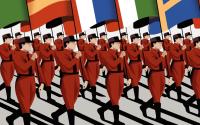By doing little to avert a famine in Afghanistan, the West is sowing the seeds for more Islamic hatredThe Observer, Sunday October 14, 2001The bombing of Afghanistan must stop. To say so isn't to appease mass murderers by pretending they are misunderstood fighters against imperialism. You can think, as I do, that the sum of human happiness would inflate exponentially if the Taliban and their Arab allies were driven from power. You can believe that the atrocities of 11 September changed the world and made hitherto unthinkable expedients necessary. You can even fall in love with Tony Blair's mythical America which stood 'side by side with us' in the Blitz of 1940, rather than staying out of the Second World War until 1941, and was 'born out of the defeat of slavery', rather than a declaration of independence by, among others, slave owners.
You can hold all these views simultaneously and still argue that this war is a moral and political disaster. Its worthwhile ends are unattainable. Its means are self-defeating. The choice before America and her supporters in Britain is to back off or inflict a famine on Afghanistan which will kill tens, maybe hundreds, of thousands and take the case for a just war with them.
Tolerance of starvation is unconscionable. It dumps supporters of bombing in the same intellectual wastebasket as those who mutter that America 'had it coming'. Afghan peasants, like the workers in the World Trade Centre, aren't strictly culpable, you understand. But if they're in the wrong place under the wrong government then, somehow, they deserve to die.
I wouldn't expect everyone in a government which employs Jo Moore to be distracted by ethical arguments. I count many hardened socialists and pacifists among my friends. For all their fierce anti-Americanism, they were too filled with shock and sympathy on 11 September to match the seediness of the propagandist's cry: 'Everyone else thinks the extermination of thousands is a problem! I see it as an opportunity!'
From what I hear, though, New Labour is beginning to worry about the political 'collateral damage'. The formal war aim - the defeat of terrorism - is a fantasy. More realistically, we might have hoped war would do the world a favour by bringing justice of a kind to bin Laden and the Taliban without creating the resentments which will breed further violence.
Starvation in Afghanistan dashes modest hopes. It provides the inspiration for future suicide bombers while inflaming intelligent Muslim opinion. The Prime Minister's interviewer on al-Jazeera TV made a comparison I suspect we're going to hear many times in the coming months. Iraqis are still paying the price of the Gulf war of 1991, he said. 'They are under sanctions and about one million Iraqi children died because of famine. Aren't you repeating the same thing in Afghanistan now?' Blair said, quite rightly, that hunger in Iraq was the fault of Saddam Hussein. He didn't answer the Afghanistan question.
FAMINE WAS COMING anyway. Oxfam warned before 11 September that drought and the economic consequences of a Taliban theocracy which couldn't create a civilisation worth clashing with would leave 1.9 million Afghans hungry by the end of the year. Clare Short and her Department for International Development had been saying for months that Afghanistan was a catastrophe waiting to happen. Christian Aid spent the summer planning an Afghan appeal for 15 September. The eradication of the means of life in Afghanistan did not therefore arrive out of a clear blue sky.
The kamikaze attacks which did halted United Nations food deliveries for three weeks. They started, stopped again when the bombing began on Sunday, and then restarted. The UN had 9,200 metric tons of food inside of Afghanistan yesterday. Officials in the World Food Programme calculate the country needs 52,000 metric tons from outside a month.
Their horrendous difficulty is not finding supplies. The Bush administration has belied its reputation for know-nothing callousness by being exceptionally generous in circumstances which might have induced parsimony, as, indeed, has Britain. There's plenty of food near the borders. But getting it in before winter closes the mountain roads next month is a nightmare. Afghanistan must have a five-month stockpile - 250,000 metric tons - in place within five weeks. If it doesn't, then voices as sober as Andrew Natsios, the administrator of Bush's US Agency for International Development, say 1.5 million Afghans risk starvation and seven million will face critical food shortages.
To make matters worse, the Afghans aren't behaving as predicted. The United Nations and aid agencies thought that 11 September would produce a rush of refugees to the borders where rudimentary camps could be prepared to shelter them. The expected exodus has been the great non-event of the war. The Taliban have banned foreign journalists and looted UN communications equipment, so no one really knows why Afghans aren't on the move. The most frightening suggestion is that most with the ability to get out fled in the Nineties. The majority of those left behind are too young, old or sick to travel far. The people who are most likely to starve, in other words, are least able to reach food stations.
Moving hundreds of convoys into one of the poorest countries in the world within weeks would probably be impossible in peacetime. It's certainly impossible during a war which Sir Michael Boyce, the Chief of the Defence Staff, said on Thursday would 'go through the winter and into next summer at the very least'.
The bombing won't last that long; there aren't enough large pieces of rubble in Afghanistan worth smashing into small pieces of rubble. But if the predictions that an apocalypse will begin some day around 20 November are half right, any stalling of food deliveries by B52s will bring mass starvation.
The officials in Whitehall who fear that Britain and America will be complicit in a calamity get angriest about the absence of co-ordination. There's no plan, they say, to share information between soldiers and aid workers and balance humanitarian and military objectives. But then an absence of coherent planning defines the conflict.
YOU MAY remember that the Northern Alliance was meant to fight America's ground war by proxy. Now we're told it is almost as brutal and unfit for power as the Taliban. Last Saturday, Alastair Campbell was adamant that Britain did not want to extend the war to Iraq. On Sunday, Bush hinted strongly that he'd like to do just that. Bush had backed away from declaring war on Iraq by Friday. He was no longer sure if the complete overthrow of the Taliban remained a war aim. Elements of the Taliban could have a role in a national government if they surrendered bin Laden, he suggested. 'If you cough him up and his people we will reconsider what we are doing to your country.'
America can't define her enemies. If the Taliban are ejected, she doesn't know who should form the next government. Blair and Bush, however, are aware that they must convince the Muslim world that they are acting justly if they wish to escape a new generation of bin Ladens. Yet their war will exacerbate a famine which may further shred America's reputation in the region.
The alternative to hunger is a generous bombing pause so food can be delivered and Washington can work out what this war is for. The Taliban aren't going anywhere and can be defeated at any time. When you don't know what you're doing it's usually best to adopt the pose of masterful inactivity and do nothing.
Watch out, there's a dinosaur about
Broadsheet pundits and academics were arguing before 11 September what description best suited an American Right which was tearing up every treaty.
'Isolationist' was rejected by one and all. The Bush administration didn't give a damn about world opinion, but was very keen on global dominance. 'Unilateralist' was the preferred label of right-thinking people. Only Dan Plesch of the Royal United Services Institute and a few other Leftish dons argued that America's refusal to recognise international law meant that technically it was an 'anarchist' state. I saw their point, but thought they were pushing it a bit after 11 September.
A generous but not necessarily inaccurate explanation of Blair's willingness to stand by America come what may is that he is trying to persuade Bush to accept the need for global security. He could have argued that US's sabotaging of controls on chemical and biological weapons in the summer, for instance, was folly when hindsight proved that no crime was unimaginable.
To call America anarchist after what she has suffered seemed cruel, until I read the debates on Jesse Helms's Amendment to Protect Servicemen From International Criminal Court.
An urgent task in the 'war' against terrorism was, said the far-Right Senator, the undermining of international justice. America must not accept the jurisdiction of a court for war criminals, even though it was supported by Britain and every other civilised country. Her military should be free to take 'any necessary action' - including the deployment armed force - to 'free US soldiers' from its cells.
'Nothing is more important that the safety of our citizens, soldiers and public servants,' said Helms. 'The terrorist attacks of 11 September have made that fact all the more obvious.'
Attacking the law against war crimes after the crimes of 11 September was at best frivolous - weren't their more pressing matters to discuss? - and at worst insane. Arguments against an impartial court which might try the bin Ladens of the future weaken America's attempt to build coalitions and present her case in the Muslim world. To then propose surgical strikes on the citizens of her allies was, surely, the ravings of a dinosaur.
Yet a proud Helms told the Senate that his amendment was 'endorsed by the Bush administration'. 'Anarchist' was the mot juste, after all.






